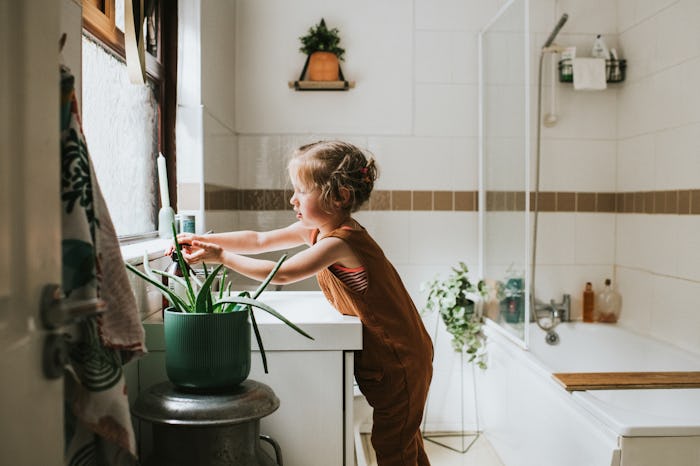Life

Here's What All That Sanitizing Is Doing To Your Immune System, Experts Say
If there’s one message the Centers for Disease Control and Prevention (CDC) has desperately tried to get Americans to appreciate this year, it’s the need to stop the spread of germs. With the COVID-19 pandemic well into its seventh month in America, avoiding germ-fighting fatigue by continuing to stay six-feet apart, wear a mask, disinfect surfaces, and regularly wash hands is paramount. But isn't some bacteria actually good for us? Is it bad we’re not exposed to as many germs right now?
“To build up antibodies, kids need to be exposed to some external germs," Dr. Elaine Larson Ph.D., an epidemiologist and professor at Columbia University, tells Romper in an email. The good (and bad) news is that you're exposed to germs regardless of your cleaning efforts or how much hand sanitizer you use. The minute a baby is born, they're exposed to all kinds of germs, some of which can actually help build up immune systems.
“Clearly, I think it would be almost impossible for a parent to keep their kids free from germs,” Dr. Larson says
“The most important prevention strategy we have now, until a vaccine, is social distancing, whether at school or home, so schools that are thoughtfully adhering to social distancing will be much safer than other schools,” Dr. Larson says.
Some experts believe that all of this super intense hygiene might just be a good thing across the board, Dr. Christopher Carpenter, M.D., Chief and Chair of Internal Medicine at Beaumont Health in Michigan, tells Romper.
"I think the impact is going to be positive in the balance, not just for COVID, but also for influenza season," he says. "That's coming up. And there's other infections too, like RSV, which is an infection that impacts both kids and adult, and Norovirus, which I would suspect is probably going to be less of a problem," says Dr. Carpenter. "I think there is overall going to be a benefit in terms of that those types of infections."
Dr. Carpenter also believes that any worries about hyped-up hygiene hurting our future immune systems should be secondary to a focus on making these diseases a thing of the past.
"Long term, the question is, is there going to be an impact on our immune system developing normally, which I'm not as concerned about. I would rather eradicate those illnesses and not have to worry about covering things like polio, measles and such. By eradicating, the better off we all are," he says.
Both in the home and at school, Dr. Larson recommends making logical risk/benefit decision when it comes to cleaning and disinfecting. Parents need to educate themselves and independently review the latest research and data, she says, then adjust their behaviors accordingly. For instance, at the beginning of the pandemic, scientists didn’t know how long the virus could live on certain surfaces. This led to people anxiously wiping down every grocery item, leaving deliveries on their doorsteps for days, and, in some extreme cases, applying round-the-clock sanitizing protocols to their homes.
“Deep cleaning all the time? I don’t think that’s necessary,” says Dr. Larson. “In general, as long as a house is generally picked up and clean, it’s not bad for children.” She adds that if someone in the household or a child at school is sick (with anything) go ahead and pull out all the cleaning supplies, but remember the virus passes through respiratory droplets. You can scrub your dining room table all you want, she says, but “you’re not to going to breathe in the virus off your table.”
Dr. Carpenter is of the same mind. He cautions parents to be skeptical when it comes to theories like The Hygiene Hypothesis (basically the idea is that extremely clean environments don't provide enough germ exposure for human immune systems, leaving them indefensible to infectious organisms). But, while that idea sounds really reasonable on the surface, Dr. Carpenter says it's not well-substantiated.
"We've had an increase in kids with asthma. We've had an increase in allergic rhinitis and, eczema, the things that are immune related. Are they occurring because we are raising our kids in too clean of an environment? I'm not convinced that that's the case. I don't think the data strongly supports it," Dr. Carpenter says.
For her part, Dr. Larson believes we should calm down our paranoia about most environmental stuff and focus on teaching kids to mind social distancing guidelines and wash their hands instead.
“One cough from an infected person will spread a lot more germs than subway handles or kitchen table tops,” she says. That’s why masks are so critical in schools. “Yelling and screaming and singing, those are much higher risk because people are breathing faster and more. That’s why we see outbreaks in choirs,” she adds.
The takeaway? Keep your cleaning levels reasonable, encourage smart COVID-19-reducing hygiene steps, and make sure your kids wear their masks.
And, Dr. Carpenter says, be diligent about getting the vaccines that are currently available. Not only will a flu shot protect children against the flu, it could prevent diagnostic confusion should a child show symptoms of both COVID and flu.
“Be as logical as one can and in crowds, especially with kids, don’t let them scream and yell as the airborne spread is the most important spread for the virus. Control play and closely monitor who they play with and where the other kids have been,” says Dr. Larson. But don’t fret over getting enough germ exposure. We all have enough to worry about this year.
Experts:
Dr. Elaine Larson, Ph.D., Anna C. Maxwell Professor Emerita and Special Lecturer, Columbia University School of Nursing and was Professor of Epidemiology
Dr. Christopher Carpenter, M.D., Chief and Chair of Internal Medicine, Beaumont Health